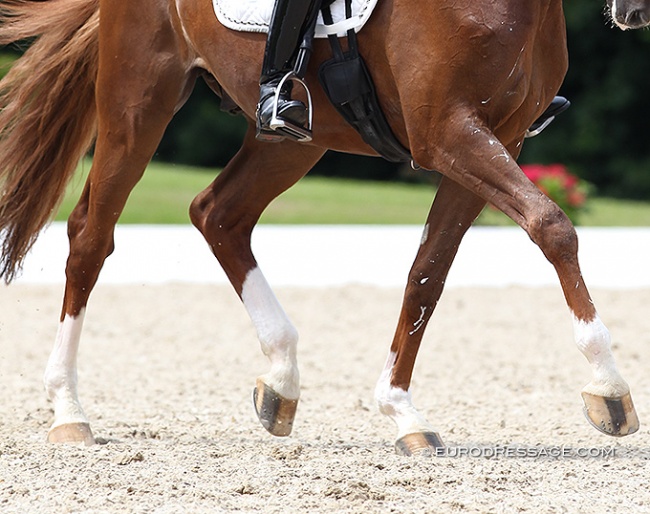
The German breed societies of Hanover, Oldenburg, Westfalia, Holstein, and Trakehnen have agreed to support the gene research being carried out into PSSM2.
St. Georg reported that the International Association of Future Horse Breeding (IAFH) is spearheading this research in co-operation with the German breeding institute VIT as well as with the Center for Animal Genetics (CAG), which holds the patent for the PSSM2 test.
PSSM2
PSSM2 is a genetic muscle disease in horses and has become a buzz word in the breeding world, now used often to explain lameness issues in horses.
Polysaccharide Storage Myopathy (PSSM) is an inherited muscle disease that affects many and diverse breeds of horses. The clinical characteristics of PSSM vary between breeds, from muscle pain, cramping and cell damage with exercise, to progressive muscle atrophy.
There are two types of PSSM:
The form of PSSM caused by a glycogen synthase 1 (GYS1) gene mutation is termed type 1(PSSM1), whereas the form(s) of PSSM that are not caused by the GYS1 mutation and whose origin is yet unknown are now termed type 2 (PSSM2)
- Type 1:
Horses with Type 1 Polysaccharide Storage Myopathy (PSSM1) have a muscle disease characterized by accumulation of abnormal complex sugars (glycogen) in skeletal muscles. The accumulation of abnormal sugars can cause breakdown of muscle fibers (rhabdomyolosis) which leads to muscle pain, weakness, skin twitching, sweating, and reluctance to move. - Type 2:
Many horses with Type 2 PSSM share many of the clinical signs of Type 1 PSSM, have excessive glycogen in their muscles, and respond to a low starch high fat diet and regular daily exercise. PSSM2 is an umbrella term for multiple muscle diseases with similar symptoms.
Until recently, PSSM2 was diagnosed by ruling out all other possibilities. If a genetic test for PSSM1 was negative, but a biopsy showed disrupted muscle formation, the horse was diagnosed with PSSM2. Four genetic variants associated with PSSM2 have now been identified.
Symptoms PSSM2
The first symptoms of PSSM2 are most often seen between 7-10 years of age.
▪ Changes in behaviour (likely related to pain) ▪ Shifting lameness (especially in the stifles)
▪ Severe muscle wasting (especially in the hindquarters and topline / shoulder girdle)
▪ Localized muscle wasting causing small divots, often resembling kick marks
▪ Coordination problems /.Ataxia
▪ Muscle tension / cramping / tying up - Stiff hindquarters - Muscle tremors
▪ Gait changes (reduced stride length, lack of drive from hindquarters, bunny hopping, rope walking, etc.)
▪ Although there is severe muscle atrophy, the creatinine kinase (CK) and aspartate aminotransferase (AST) usually remain within normal parameters.
German Breed Societies Support Research
The five major German breed societies are now making their DNA profiles available for research into PSSM2.
More awareness for gene research in the warmblood sport horse has come since diseases such as Warmblood Fragile Foal Syndrome (WFFS) helped explain abortions and non-pregnancies for instance.
Related Links
Shivers: Disease, Diagnosis, Treatment and is it Hereditary?
Dark Ronald xx, Not Origin Horse for Warmblood Fragile Foal Syndrome (WFFS)
U.S. Breeders and Stallion Owners on Alert for Warmblood Fragile Foal Syndrome